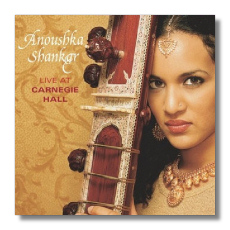
The Internet's Premier Classical Music Source
Related Links
- Latest Reviews
- More Reviews
-
By Composer
-
Collections
DVD & Blu-ray
Books
Concert Reviews
Articles/Interviews
Software
Audio
Search Amazon
Recommended Links
Site News
 CD Review
CD Review
Anoushka Shankar

Live At Carnegie Hall
- Introduction
- Raga Madhuvanti: Adap
- Raga Madhuvanti: Gat In Rupak (7-beat)
- Raga Desh
- Bhupali Tabla Duet
- Raga Mishra Piloo
Anoushka Shankar, sitar
Bikram Ghosh & Tanmoy Bose, tabla
Ajay Sharma & Barry Phillips, tanpura
Anthony Karasek & Natsha Ahmad, tanpura
EMI Angel 34922
Like father like daughter? Not quite… and not bad. Anoushka Shankar's fourth album (the first one without her dad's accompaniment) is sprightly, intensely rhythmic, inventive, and altogether satisfying. Ravi Shankar composed the four pieces, so his influence is not far off. However, Anoushka forges her own identity in these tradition-based ragas, some of which contain very modern touches. The energy simmers beneath the lid even in her classically contemplative pieces, like the alap (slow arrhythmic introduction) in Raga Madhuvanti, only to boil over in the last two minutes. By the time the tabla players join her in the second movement gat, she is playing the sitar allegretto with palpable restraint. Nearly all of her work consists of staccato plucking, with little of the legato whine notable in her father's recordings from the sixties.
As with the piece Yaman Kalyan on her Anourag (EMI 56969, 2000), she performs Raga Mishra Piloo as variations on a simple melody. She states the melody, takes it on a wild spin, then returns to it to snatch another variation, even more energetic than the first. Incidentally, the piece bears little resemblance to her father's Raga Mishra Piloo from A Morning Raga, An Evening Raga (1969), recently re-released by EMI. The previous piece moves at a classic pace, starting very slowly, gradually building speed and intricacy, then ending in a compacted and frenetic outburst. Anoushka's piece is quite different, wild and whirling almost from the first few minutes and virtuosic throughout. While she expressed misgivings about releasing a live album, she needn't worry. Like her father's show-stopping appearance at the Monterey Pop Festival (1967), this one is a crowd pleaser.
Copyright © 2002, Peter Bates



















